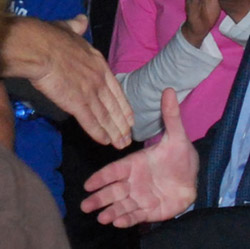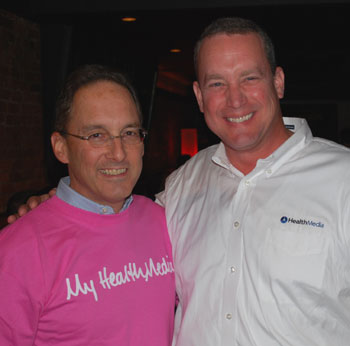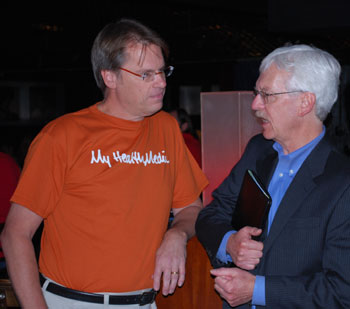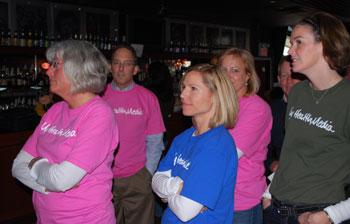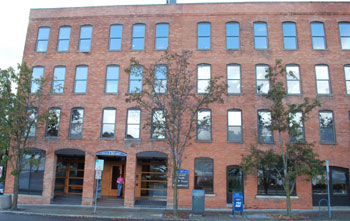Live at PJ’s: It’s HealthMedia!
If you’ve just described your company as “the coolest damn company in the world,” how do you announce to your 150 employees – 95% of whom are shareholders – that the company has been acquired by Johnson & Johnson? If you’re Ted Dacko, president of HealthMedia, you take advantage of the venue you’ve selected for the mid-afternoon announcement. You’re at a nightclub with an excellent AV system (Live at PJ’s), so you cue up the company movie.
As the fast-paced sequences of still images, synced to the tempo of Angels and Airwaves’ “Heaven,” flickered past the assembled employees’ attentive stares, it seemed pretty clear they’d seen most of it before – except for the final frame: “HealthMedia is now a Johnson & Johnson company.” And that frame drew the applause it was designed for.
For some employees, it was a confirmation of the rumors they’d heard. Dacko tackled head-on the possible uncertainty he thought that some employees might be feeling, emphasizing that this was not a “financial acquisition” for Johnson & Johnson, but rather a “growth acquisition” – meaning that HealthMedia was the first investment Johnson & Johnson was making in a division called the Office of Strategy and Growth. The plan is to grow HealthMedia from a $23 million company to a half billion dollar company.
Dacko said that the plan was to retain all employees and that this was not like two auto companies merging, and then immediately trying to squeeze out various parts, leaving a completely different looking entity going forward. It’s hard to know if the company movie soundtrack was chosen specifically for the final lyric, “Please stay/Don’t go/I’ve got you now/Are you curious?/Please stay,” but it seemed apt given Dacko’s assurance of sticking to the place and people that had brought them this far.

Ted Dacko holding a poster of a cockroach, which recalled some earlier, harder times for HealthMedia, a company like a cockroach - it might be bad off, but you just couldn't kill it.
This was not a guarantee of lifetime employment, Dacko told the assembled group, but they should not go home tonight thinking “Oh crap, I’m going to get laid off.” In describing HealthMedia as now a wholly owned independent subsidiary of Johnson & Johnson, Dacko focused on the “independent” part. He stressed that HealthMedia would keep the same sign on the front of its First Street building, would continue in its same line of business, would retain its company culture, but would go global faster.
In fact, HealthMedia has already entered the global market, with clients in Germany, France, Italy, Ireland, Japan, Australia, and Singapore. But in a sense, HealthMedia’s most important client, which came on board in 2003, was an American company: Johnson & Johnson. They liked the HealthMedia product so much, said Dacko, they decided to buy the company.
What exactly is HealthMedia’s product? Let’s say you’re an employer who’s concerned that your workers are suffering from stress, coronary heart disease, asthma, depression, diabetes or any number of other health conditions that could be partly ameliorated through behavioral modification. What HealthMedia does is offer web-based educational and coaching modules that assist people in a self-directed way to adjust their behaviors for a maximum benefit to their own quality of life.
Say, for example, someone has a health condition that could be addressed in part by walking every day. HealthMedia offers coaching products that work by monitoring walking mileage – with that mileage upload-able from a pedometer directly into the coaching program. Don Turner, director of solution planning for HealthMedia, said of their approach to eating, “it’s not a diet,” and compared it to coaching people as opposed to forbidding them to eat certain foods. So, Turner assured us, “You can still have a cupcake!” Which was good news for anyone within earshot and arm’s reach of the several dozen cupcakes loaded onto tables for the occasion of the announcement. (Based on appearance, the cupcakes looked like they’d come from Cupcake Station.)
What the employer can expect as a result of workers’ participation in HealthMedia programs are workers who are at work more often and more productive when they are present. Turner explained to The Chronicle that the outcomes measurements for each of the products are made at the beginning of a program (baseline), and then again at 30, 90, and 180 days. Insurance claims data analysis also showed the financial benefit of HealthMedia’s programs, said Turner. Turner said the financial benefit to a company using HealthMedia programs could range from $600 per person per year to thousands of dollars per person per year. HealthMedia CFO John Ternes pointed out that this savings was especially significant given the cost of the products at a few dollars per head.
Asked if HealthMedia itself used its own programs as an employer, Turner said, “Absolutely. We eat in our own kitchen.”
If HealthMedia is a kitchen, then it’s fair to ask, Who’s the chef in that kitchen? Otherwise put, who knew enough about health and behavior modification to cook up the basic concept? That would be Victor Strecher, Professor of Health Behavior and Education at the University of Michigan School of Public Health, who founded HealthMedia some 10 years ago. The company is a University of Michigan spinoff, with the UM retaining some equity as a part of the licensing of the technology – equity which will bring the UM around $1.7 million as a part of HealthMedia’s sale. That licensing was accomplished with the help of Ken Nisbet, executive director of the UM technology transfer office. In acknowledgment of that key role, Nisbet was called to the front of the group by James Epolito, head of the Michigan Economic Development Corp., who was on hand to mark the occasion along with Michael Finney, CEO of SPARK; Cynthia Wilbanks, UM vice president of government relations; Rick Snyder, CEO of the Ann Arbor venture capital firm Ardesta; Roger Fraser, city administrator of Ann Arbor; and John Hieftje, mayor of the city of Ann Arbor.
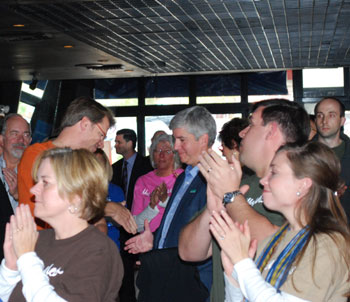
Victor Strecher and Rick Snyder shake hands, celebrating the acquisition of HealthMedia by Johnson & Johnson.
Snyder was instrumental in providing some early venture capital investment to HealthMedia through Avalon Investments, and continues to serve as chair of SPARK’s executive committee after helping to found the economic development agency. SPARK supported HealthMedia with talent recruitment, marketing outreach and business development.
It wasn’t a smooth ride for Strecher and HealthMedia to acquisition by Johnson & Johnson. In fact, just after the internet bubble burst in 2001, HealthMedia looked nearly dead, missing payroll a few times, borrowing money from its employees. When Strecher took the mic, some hint came of why the company didn’t die. That hint came from the founding story Strecher told, which showed how personally invested he is in this enterprise. It’s rooted in the wait for a heart transplant for his daughter and not knowing what the options were. Sifting through the information, evaluating various studies, Strecher said his father (who was on hand to share in the occasion today) asked him, “Don’t you do this for a living?” The elder Strecher joked that he was not “to blame” for the creation of HealthMedia.
Dacko also gave a lot of credit to Snyder, who said that he’d had a one-hour meeting that grew into a three-hour meeting, at the end of which Snyder and Dacko had a handshake understanding moving forward. There were plenty of other handshakes at today’s event: Eagle-eyed Chronicle readers will have already noticed that the hands shown mid-shake at the top of this story are from a larger photo of Snyder and Strecher just above.

Michael Finney, CEO of SPARK, joked that he tried hard to hit the required dress code, but didn't figure on the T-shirts that the HeathMedia employees were wearing.




